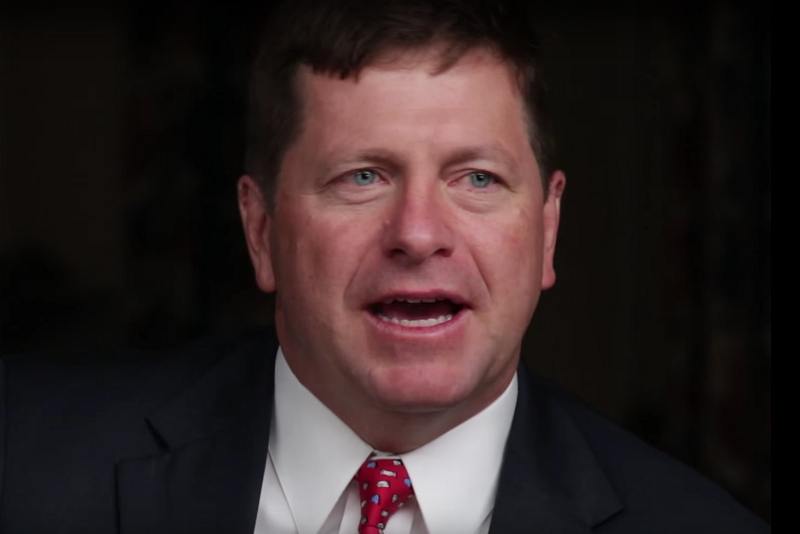BROWSE BY TOPIC
- Bad Brokers
- Compliance Concepts
- Investor Protection
- Investments - Unsuitable
- Investments - Strategies
- Investments - Private
- Features/Scandals
- Companies
- Technology/Internet
- Rules & Regulations
- Crimes
- Investments
- Bad Advisors
- Boiler Rooms
- Hirings/Transitions
- Terminations/Cost Cutting
- Regulators
- Wall Street News
- General News
- Donald Trump & Co.
- Lawsuits/Arbitrations
- Regulatory Sanctions
- Big Banks
- People
TRENDING TAGS
Stories of Interest
- Sarah ten Siethoff is New Associate Director of SEC Investment Management Rulemaking Office
- Catherine Keating Appointed CEO of BNY Mellon Wealth Management
- Credit Suisse to Pay $47Mn to Resolve DOJ Asia Probe
- SEC Chair Clayton Goes 'Hat in Hand' Before Congress on 2019 Budget Request
- SEC's Opening Remarks to the Elder Justice Coordinating Council
- Massachusetts Jury Convicts CA Attorney of Securities Fraud
- Deutsche Bank Says 3 Senior Investment Bankers to Leave Firm
- World’s Biggest Hedge Fund Reportedly ‘Bearish On Financial Assets’
- SEC Fines Constant Contact, Popular Email Marketer, for Overstating Subscriber Numbers
- SocGen Agrees to Pay $1.3 Billion to End Libya, Libor Probes
- Cryptocurrency Exchange Bitfinex Briefly Halts Trading After Cyber Attack
- SEC Names Valerie Szczepanik Senior Advisor for Digital Assets and Innovation
- SEC Modernizes Delivery of Fund Reports, Seeks Public Feedback on Improving Fund Disclosure
- NYSE Says SEC Plan to Limit Exchange Rebates Would Hurt Investors
- Deutsche Bank faces another challenge with Fed stress test
- Former JPMorgan Broker Files racial discrimination suit against company
- $3.3Mn Winning Bid for Lunch with Warren Buffett
- Julie Erhardt is SEC's New Acting Chief Risk Officer
- Chyhe Becker is SEC's New Acting Chief Economist, Acting Director of Economic and Risk Analysis Division
- Getting a Handle on Virtual Currencies - FINRA
ABOUT FINANCIALISH
We seek to provide information, insights and direction that may enable the Financial Community to effectively and efficiently operate in a regulatory risk-free environment by curating content from all over the web.
Stay Informed with the latest fanancialish news.
SUBSCRIBE FOR
NEWSLETTERS & ALERTS
Will SEC Chair Clayton Ease Up on CEO Certifications?
by Howard Haykin
Jay Clayton gave his first speech as SEC Chair on Saturday, August 12, at the Economic Club of New York - the same locale at which Mary Jo White gave her last public address as SEC Chair. Mr. Clayton opened the speech by sharing his perspective on the SEC and the principles that should guide where it goes from here. He further mentioned specific areas on which he would like to see the Commission to take action in the near-term.
What caught my attention was PRINCIPLE #7, and the possible implications it might have for broker-dealers. Let's have a look.
Principle #7: The costs of a rule now often include the cost of demonstrating compliance.
Rules are meant to be followed, and the public depends on regulators to make sure that happens. It is incumbent on the Commission to write rules so that those subject to them can ascertain how to comply and — now more than ever — how to demonstrate that compliance. Vaguely worded rules can too easily lead to subpar compliance solutions or an overinvestment in control systems. We must recognize practical costs that are sure to arise.
For example, when the SEC requires a Chief Executive Officer to make a certification that a specific requirement has been met, while he or she retains ultimate responsibility, realistically, it should be expected that the responsibility will be supported through the chain of command in a demonstrable manner. This can be an expensive practice that goes well beyond a prudent management and control architecture; when third parties, such as auditors, outside counsel, and consultants, are involved, the costs — financial costs and, in many ways more important, the cost in terms of time — can skyrocket.
This may be the appropriate regulatory approach, and to be clear, in some areas I think it is. However, the Commission needs to make sure at the time of adoption that we have a realistic vision for how rules will be implemented as well as how we and others intend to examine for compliance.
Mr. Clayton seems to rue the ‘sorry state of compliance’ [my words] where those subject to SEC rules, in some cases, must incur 'skyrocketing' costs for the sole purpose of demonstrating that they've complied with the rules. Take, for example, SEC rules that require a Chief Executive Officer to make a certification that a specific requirement has been met.
One would hope that the basis for the CEO’s certification could be readily evidenced or demonstrated. Yet, all too often a firm must engage in an expensive and time-consuming process that takes on a life of its own. Firms will often bring in third parties – i.e., auditors, outside counsel, and consultants – at great cost and time to substantiate “the prudent management and control architecture” that underlies the certification.
Whether or not the problem lies with "vaguely worded rules," Clayton thinks that such costs and efforts can “too easily lead to subpar compliance solutions or an overinvestment in control systems.”
FINANCIALISH TAKE AWAY. Mr. Clayton's statement and sentiment seem to play well with the "deregulation" theme that pervades Washington, D.C. As such, one should not be surprised to see Mr. Clayton's SEC lighten the regulatory burdens of Rule 15c3-5 under the Securities Exchange Act of 1934, "Risk Management Controls for Brokers or Dealers with Market Access."
And, once that's accomplished, what might happen with FINRA Rule 3130, "Annual Certification of Compliance and Supervisory Processes?" After all, the 2 requirements go hand-in-hand - even though the SEC Rule 15c3-5 CEO certification requirement is a separate and distinct certification from the FINRA Rule 3130 certification requirement.
If the certification requirements are toned down, broker-dealers can expect to reap substantial cost saving - though at the expense of third party consultants.





